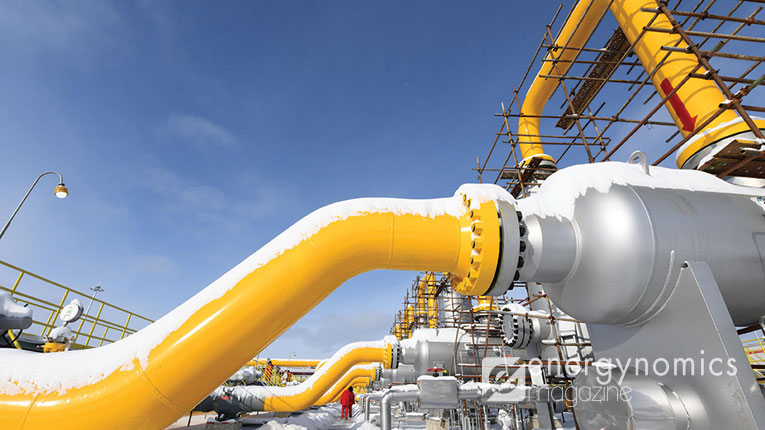Dutch TTF gas futures are seen as a Europe-wide natural gas benchmark. They reached 96.65 euros per megawatt hour (euro/MWh) on October 4, 2021, as gas prices rose to record highs across Europe as the continent experienced a supply shortage. At the same time, on the most important regional market, the Austrian hub CEGH, the gas price for November exceeded 120 euro/MWh. In Romania, the gas with delivery in November was bought at a price of 650 lei/MWh (131.35 euro/MWh) in several transactions recorded on the Romanian Commodity Exchange – RCE platforms.
Prices have increased more than threefold this year as European inventories remain below normal after a prolonged winter last season. Besides lower Russian supplies, patchy domestic production and high Asian demand for liquefied natural gas have also contributed to the region’s energy crisis.
In the beginning of November, the resumption of Russian gas flows “have calmed traders’ nerves and prices after a week of volatility,“ wrote Bloomberg. European natural gas prices slumped to the lowest in 3 weeks as Russian supplies gradually increased and Russian President Vladimir Putin said that Gazprom would refill its European storage facilities after finishing Russia’s domestic stockpiling campaign. However, Russian deliveries remained much lower than normal for the time of the year. “Gazprom is not helping. We do not see significant additional volumes,” according to Sergei Makogon, head of the Gas Transmission System Operator of Ukraine. “Transit via Ukraine is significantly below last year”, he said for Bloomberg, on November 10.
And then the German regulator suspended Nord Stream 2 link certification. European natural gas futures jumped to near a four-week high on delays in starting up a controversial new pipeline from Russia. The German regulator said on November 16 it suspended the certification procedure for the Nord Stream 2 project because the operator should set up a German subsidiary, which will be the owner of the section of the pipeline in the country. The permitting process has been halted until assets and people are transferred to the new unit. Benchmark European gas prices surged as much as 19% as the move adds to the uncertainty over how much of the fuel the energy-hungry market will have this winter. Many in Europe expect Russia to significantly increase supplies only when the pipeline is approved.
Russia is not the cause, but…
“There are a lot of causes for this energy crisis in Europe and I will not mention all of them, including weather, droughts in China, huge demand for gas from Asia and others”, HE Richard L. Morningstar, Former US Ambassador to the European Union and Founding Chairman of the Atlantic Council, told Energynomics. “I want to say right out that Russia is not the cause of the crisis. However, Russia could have been doing a lot more to mitigate the crisis and to alleviate it by shipping more gas to Europe, by filling up reserves and so forth. They’re beginning to do that slightly but they can do a lot more. I think [President Vladimir] Putin has been very clever, he has basically said «Fine, you want more gas, get Nord Stream approved», using leverage to try to get Nord Stream approved more quickly. He is also saying «You’re willing to rely on a spot market for LNG, well, look what’s happened! What you need is long-term contracts», meaning long-term contracts with Russia. I think he’s playing it very smart, he has complied with all of their existing agreements but not doing anything to really help the situation.”
… it could have done a lot more
Gazprom signaled on November 15 it has little appetite for increasing next month’s gas volumes that transit through other territories into Europe. “Gazprom’s reluctance to acquire short-term transmission capacity to increase or even maintain its flows across Ukraine and Poland has led to discussions on potential linkages to the possible entry into operation of the Nord Stream 2 pipeline,” the Agency for the Cooperation of Energy Regulators said in a market report, according to Bloomberg.
Stefan Ulrich, an associate in BloombergNEF’s European gas team, said in a note: “It is likely that a tight European gas market will persist and have to get through the early stages of the gas winter without the pipeline.” Even more worried, Jeremy Weir, chief executive officer of Trafigura Group, said: “We haven’t got enough gas at the moment quite frankly. There is a real concern potentially, if we have a cold winter, we could have rolling blackouts in Europe.”
Russia is the culprit, a common front is needed
The natural gas prices surge is led by the Russian Federation, through Gazprom, stated repeatedly the Romanian Minister of Energy, Virgil Popescu. “We have a natural gas crisis, which is an artificial crisis created by the Russian Federation, through Gazprom. You have seen how sensitive the natural gas market is. When the German regulator announced that it would postpone the approval of the Nord Stream 2 pipeline, the price of natural gas automatically increased. I think that a common front of all the member states is needed to put a lid on this energy crisis”, said Virgil Popescu.
From the same data, HE Richard L. Morningstar extracted a slightly different approach. “This [situation] creates a problem for Europe and for the United States. [President Vladimir Putin] has complied with all of his agreements, I think it’s going to be difficult for the U.S. and Germany, for example, to agree on new sanctions against Russia because of this, even though I would certainly argue that Russia is using energy as a political weapon. What it means for certain is that we’re all going to have to cooperate to develop alternative energy sources to mitigate any dependence on Russian gas. That includes more gas infrastructure and investment in gas infrastructure including for example the Black Sea project which I think, I hope will go forward. The Three Seas’ initiative is important, and also is important to double down on the green transition”, he said for Energynomics. “The more green energy that’s created, the less dependence there’ll be on Russia,” said HE Richard L. Morningstar.
The natural gas in the Black Sea is the only solution
The natural gas in the Black Sea is the only solution for Romania to secure its access to energy, affirms the Oil and Gas Employers’ Federation (FPPG). “Unfortunately, despite the industry’s efforts to communicate the specifics and benefits of offshore natural gas projects, the legislation in force (adopted in 2018) blocked the investments planned by companies and, implicitly, the advancement of projects”, wrote Cătălin Niță, Executive Director of FPPG, in a press release.
FPPG insists that the solution for our country to avoid crisis as the current one is to adopt a stable and predictable long-term energy policy that stimulates investment and, consequently, domestic energy production.
In a balanced, stable and competitive legislative and regulatory context, Romania would have been much better prepared, having new energy sources in production today. Such an example is represented by the Black Sea gas projects, which could have been launched years ago, under conditions of an offshore legislative framework suitable for investments of this magnitude, wrote FPPG. FPPG representatives have organized extensive discussions with members of the Romanian Parliament on the need for clear provisions on fiscal and legislative stability, a balanced tax system and free-market mechanisms. “We need this legislative framework today, as tomorrow may be too late!”
—————————————-
This article first appeared in the printed edition of Energynomics Magazine, issued in December 2021.
In order to receive the printed or electronic issue of Energynomics Magazine, we encourage you to write us at office [at] energynomics.ro to include you in our distribution list. All previous editions are available HERE.

